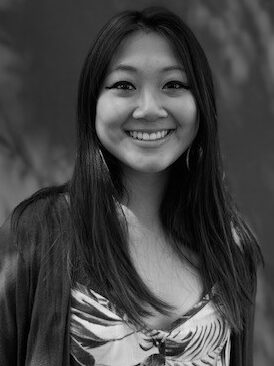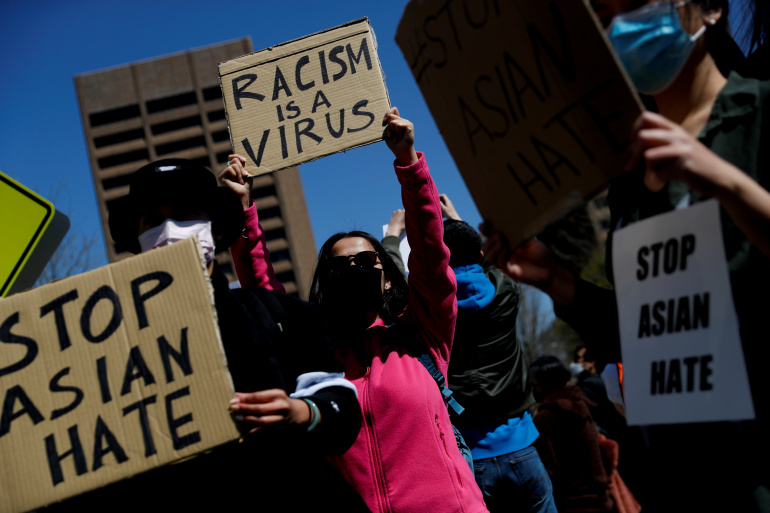By Guest Contributor: Wendie Yeung
Content Warnings: this article contains the author’s personal experiences facing racially charged violence.
While most of America reminisced about March as the one year anniversary since normalcy, I, like so many other Asian Americans, had been grappling with the pandemic months before that. When I heard the beginning media buzz of a mysterious new coronavirus found in Wuhan in early January of 2020, my heart sank. I knew that from that point on, my racial identity was going to become a stark liability. At the time, I was flying for work every week, and I became hyper aware on my flights and in the airport. If people looked at me, I’d wonder why (“do they think I’m from China?“), trying to read any suspicion behind their eyes. I’d smile at strangers to appear more friendly; if I was on the phone, I’d talk a little more loudly so those around me could hear that I spoke perfect English. These acts were things I did almost instinctively – protective acts so people knew that I was not a threat, that I was “American”.
These acts were things I did almost instinctively – protective acts so people knew that I was not a threat, that I was “American”.
As the situation worsened and the virus began to spread around Asia, my mother implored me to wear a mask on the airplane but only if other people were wearing one. “If you are the only person wearing a mask, you might look like….you know. They might say or do something.” The implication was clear.
The sensitivity to how others may perceive me pervaded nearly all my actions through January and early March. I’d carry my mask with me, watching for any passengers, preferably white ones, who were wearing a mask – when I did see someone, it was the green light to put mine on. I’d make sure to put on makeup and dress neatly so people could see I was just another good, working professional. I felt more secure if I went to the airport with white or non-Asian colleagues. I was embarrassed and conflicted over these exhausting exercises. Growing up, I’d always shied away from my Chinese heritage given most of my hometown and friends were white. Only in recent years have I re-embraced my cultural identity. Now, I felt like I was back to square one: running away again.
After quarantine began, I was slated to head down to Palm Springs to hunker down with my family and relatives. I dreaded leaving the safety of my diverse city of San Francisco. Not being in the familiar politics of the Bay Area, I didn’t know what to expect. It didn’t help that I’d previously seen several Trump rallies and multiple ’45’ stickers on cars in the desert area. Once I arrived, a new wave of anxiety washed over me.
My fears deepened when I heard Trump talking about the pandemic, saying things like “Kung Flu Virus.” Hearing the crowds’ raucous laughter and Fox News pundits dismissing the significance of his words felt even worse. Individuals who say that his words are not a big deal or “don’t mean anything” are most likely the privileged who have never had to worry about the real and tangible harm that words can cause. I knew that even if Trump hadn’t said anything, there would still be some increase in anti-Asian sentiment. But to have the President of the United States instigating that behavior horrified me. I’d read about the rising hate crimes against Asian Americans and knew it was only going to get worse. With all this in mind, my daily runs around the neighborhood became not just a physical endeavor but a mental one as well.
In order to reach my running path, I needed to cross a major intersection. Standing on the sidewalk in a very white town facing 8 rows of cars positioned 180 degrees around me, I felt like me and my ethnicity were on full display to everyone. I felt vulnerable. Every additional second I stood there felt like a potential invitation for something to happen – if someone yelled out the window or something worse. I’d already felt this same awareness as a female, but now there was an added layer of race. “I just want to make it to the other side of the sidewalk without anything happening,” I’d think. Sometimes I’d wear a hat and sunglasses in addition to my mask so I’d look racially ambiguous. The moment the light turned green, I’d sprint. Once I reached the other side, the normal part of my run could officially start.
More than my own safety, I worried about that of my parents. My parents are Taiwanese immigrants and my mother was a small Asian woman with a noticeable accent. My parents told me of a particular incident at the grocery store that happened before I arrived, in which a man had followed my dad around and continuously called him “a Chinaman”. When I heard this I felt more relief than anger: first, a slight sense of relief that all of my internal worries and cycling through seemingly extreme scenarios was, to a certain extent, validated. These racist incidents could very well happen to us, not just ‘those other people’ on the news. Most of all, I felt relief that nothing else had happened.
One particular incident occurred when my parents and I were on our way home from a hike. When we entered our neighborhood, we passed by a man in his golf cart driving the opposite way. Just as we got out of our car, I saw the same man passing by our house. My parents and I exchanged glances as we gathered our things. “Was he following us?” my mother asked quietly, seeming slightly bemused. While it was not outside the realm of possibility that the man was taking a little ride around the neighborhood that just happened to be at our home, our relatives’ house was on the other side of the neighborhood and it took a few turns, tucked away at the end of a road. He must have immediately turned around upon seeing us and trailed our car to reach our part of the neighborhood. I watched him as he made a little semicircle and rode away. I recognize his intentions may have been completely innocent – maybe he was just been curious about who we were or where we lived, or perhaps he wasn’t used to seeing Asians around the community. While I would have previously brushed off this encounter, in the current climate I was on edge for over a week. I kept wondering: why did he want to know where we lived?
Slowly, the paranoia faded and I found myself shaking my head at my fears. Silly me, what did I think was going to happen? This frequent self-gaslighting has been a key theme of my pandemic experience. I’ve gone back and forth between feeling scared and then ridiculing myself:
Many Asian Americans “have it good” unlike so many others in this country. What do I have to complain about?
I had never been particularly outspoken about racism against the Asian American community because I felt that my own experience paled in comparison to what other BIPOC face every day, a testament to how the Asian American is often seen as less capable of experiencing racism. In reality, the Model Minority Myth seeks to undermine Black pain while rendering existent violence against Asian Americans invisible. Furthermore, the lack of media coverage made me feel like my anxiety was overblown and unwarranted. Perhaps this is what some of my friends thought as well, including those who pride themselves on being “woke.” When I voiced concerns, their sympathies seemed shallow and dismissive. I could almost read between the lines: “What do YOU have to be so afraid of?”
It appears that question has finally been answered through the confirmation of my worst fears. I sit here writing this the morning after 6 Asian women were murdered by a white domestic terrorist in the Atlanta mass shooting. People have called the incident ‘shocking’; people have asked how I’m feeling. In all honesty, I feel tired but I’m not shocked. No doubt, it is an abominable, tragic incident but the first time Trump uttered “China Virus,” a lot of us saw this coming. Something bad was ultimately going to happen, and this was it. This shooting was the boiling point, the culmination of four years of racism, gendered and classist violence, the manifestation of Trumpism and an entire ecosystem that enabled Trump to spread and legitimize anti-Asian vitriol in the public sphere.
This shooting was the boiling point, the culmination of four years of racism, gendered and classist violence, the manifestation of Trumpism and an entire ecosystem that enabled Trump to spread and legitimize anti-Asian vitriol in the public sphere.
So what am I afraid of? The same thing every person of color is afraid of. This. That this has happened in the past, and that it could happen again to any of us. That things can change so quickly while at the same time, changing so little. How do I feel? I feel that America has always had blood on its hands. And until we work to dismantle the white supremacy and misogyny that led us here, it always will.

Wendie is a management consultant based out of the Bay Area, and is passionate about non-profit work and economic development in the community. She has had her writing published at Red Pocket Magazine and work forthcoming at The Rumpus.
Learn more about Reappropriate’s guest writing program and submit your work here.

